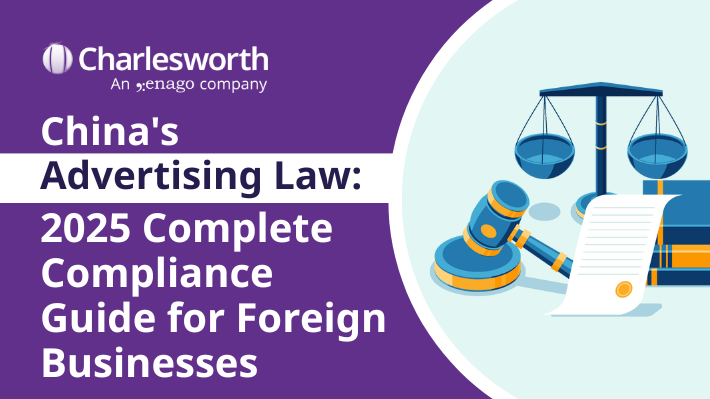China’s Advertising Law: 2025 Complete Compliance Guide for Foreign Businesses

In the ever-evolving world of advertising, understanding and complying with regulations is essential for businesses, especially when entering foreign markets. China, with its unique cultural and legal landscape, has put in place specific advertising laws that foreign businesses must adhere to in order to operate successfully within the country. These laws not only aim to protect consumers but also maintain social harmony and respect for national symbols, cultural values, and fairness in the market.
The stakes are particularly high, with major regulatory updates that foreign businesses cannot afford to ignore. Non-compliance with online advertising laws in China can result in severe penalties ranging from 100,000 RMB to 2 million RMB, depending on the violation’s severity.
Overview of China’s Advertising Laws
1. Protecting Consumers: A Primary Concern
China’s advertising law emphasises that advertisements should not harm the legitimate rights and interests of consumers. While the primary goal for businesses is to make a profit, the law stresses that this must be balanced with ethical responsibility.
- Goal of Advertisements:
- Advertisements must aim to inform, persuade, and entertain without misleading consumers.
- The law ensures that advertisements reflect the truth and do not make unsubstantiated claims.
- Consumer Welfare:
- Protecting the consumer’s physical and mental well-being is paramount.
- Businesses must refrain from making exaggerated claims or promoting harmful products.
- Focus on Transparency:
- Clear disclaimers and substantiated claims are required to protect consumers from being misled.
- Clear disclaimers and substantiated claims are required to protect consumers from being misled.
2. Restrictions on Advertising to Minors
China’s advertising law places strict limitations on content aimed at minors to protect their physical and mental well-being. These laws focus on preventing exploitation and exposure to harmful or misleading content.
- Content Restrictions:
- Prohibited Ads for Certain Products: Ads for medical products, alcohol, online games, and cosmetics are banned from targeting minors.
- Advertisements for Unsafe Behaviours: Ads should not encourage children to imitate dangerous behaviours.
- Parental Influence:
- Inducing Purchases: Ads that try to induce minors to persuade their parents to buy products are prohibited.
- Focus on Protecting Minors: The law aims to prevent the exploitation of children in advertising by focusing on their vulnerability.
3. Respect for National Symbols and Cultural Values
China’s advertising laws place significant emphasis on respect for national symbols, cultural values, and dignity.
- Prohibited Use of National Symbols:
- National Flag, Anthem, and Emblem: Advertisements cannot use or disguise the use of China’s national flag, anthem, or emblem to promote products.
- Military Symbols: The law forbids using military-related symbols in advertisements, which could be seen as undermining their significance.
- Respecting the Country’s Dignity:
- Avoiding Dilution of National Symbols: Using national symbols in advertisements for everyday products (e.g., detergent or cars) is prohibited to maintain the prestige of these symbols.
- Potential Consequences of Disrespect: The law is clear about the need to maintain the dignity of the national symbols and to prevent any actions that may be seen as disrespectful.
- Cultural Sensitivity:
- Ethical Advertising: Advertisements should always align with the country’s values and avoid using national icons in a trivial or inappropriate context.
- Ethical Advertising: Advertisements should always align with the country’s values and avoid using national icons in a trivial or inappropriate context.
4. Equality and Fair Competition
The law enforces the principle of equality by prohibiting misleading or exaggerated claims that could create an unfair competitive advantage.
- Prohibition of Superlative Claims:
- Terms Like “Best” and “National Level” Claims such as “best” or “number one” must be substantiated with evidence. Businesses are not allowed to make vague or exaggerated claims without proof.
- Preventing Monopolies: The law aims to prevent companies from gaining an unfair advantage by using terms that imply their products are superior without proper justification.
- Fair Advertising Practices:
- Avoiding Deceptive Practices: Advertisements should focus on the qualities of the product rather than making false claims about being the best or the highest quality.
- Promoting Equal Market Access:
- All Businesses Have Equal Opportunity: By restricting exaggerated claims, the law promotes an even playing field where companies compete fairly based on the merits of their products.
- All Businesses Have Equal Opportunity: By restricting exaggerated claims, the law promotes an even playing field where companies compete fairly based on the merits of their products.
5. Disparaging Competitors: A Clear No-No
According to Article 13, companies must not disparage the products of others, highlighting the importance of ethical and fair competition in the market.
- Prohibition of Negative Advertising:
- Disparaging Competitors: Directly or indirectly criticising the products or services of competitors to gain market advantage is prohibited.
- Focus on Merit-Based Competition: Companies must focus on promoting their own products rather than criticising others to win market share.
- Maintaining Industry Integrity: The law ensures that businesses compete on the basis of product quality and innovation, rather than using negative tactics against their rivals.
6. Maintaining Social Harmony and Stability
China’s advertising law also contributes to social stability by restricting harmful or inappropriate content in advertisements.
- Prohibited Content:
- Obscene, Violent, or Superstitious Content: Ads that promote harmful or sensitive behaviours, such as violence, gambling, or pornography, are prohibited.
- Discriminatory Content: Ads cannot contain any content that promotes ethnic, racial, religious, or gender discrimination.
- Protection of Public Order:
- Preventing Disruption: Advertisements should contribute positively to society and should not hinder public order or create controversy.
- Environmental Responsibility:
- Respecting Cultural and Environmental Values: Advertisements should not harm the environment or violate cultural norms.
- Respecting Cultural and Environmental Values: Advertisements should not harm the environment or violate cultural norms.
Conclusion: A Framework for Ethical Advertising
China’s advertising regulations in 2025 emphasise critical principles such as consumer protection, respect for national symbols, fair competition, and social stability. These laws encourage businesses to think critically about the impact of their advertisements and ensure they are not only legally compliant but also ethical in their messaging.
- Key Takeaways:
- Advertisements should be truthful, respectful, and transparent.
- The welfare of consumers, particularly minors, must always be prioritised.
- Advertisers should maintain fairness in competition and avoid disparaging competitors.
- National symbols and cultural values must be handled with care to avoid disrespect.
By understanding and respecting these laws, foreign businesses can build a strong and trustworthy presence in China, avoiding legal pitfalls and contributing positively to the market’s integrity.
If your business wants to grow in China, Charlesworth can help with over 25 years of experience in the field.


